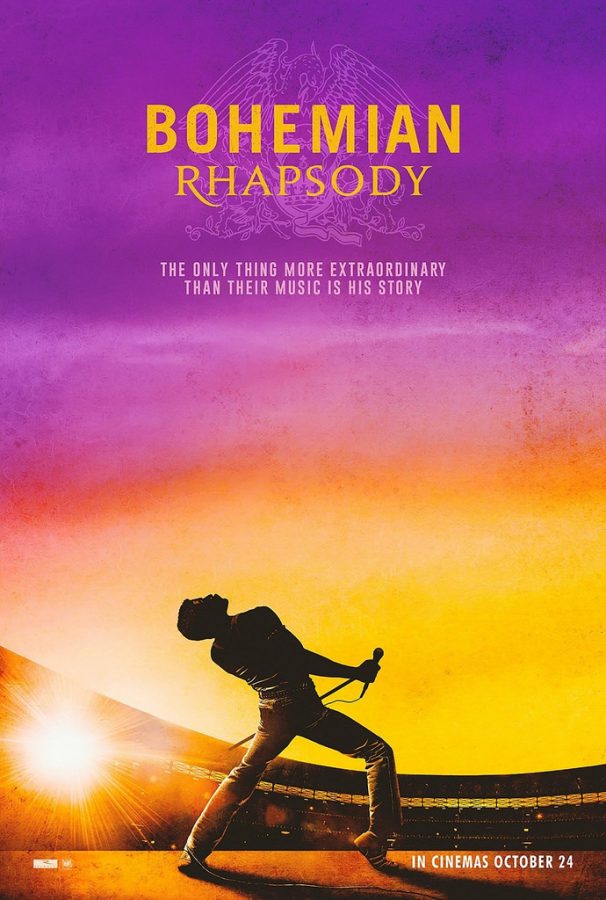Bohemian Rhapsody: A Review
Today marks the third week since the release of “Bohemian Rhapsody,” the rock biopic that earned a domestic total of 108 million dollars as of Nov. 15 and over 185 million overseas. Directed by Bryan Singer, the film stars actor Rami Malek as Queen frontman Freddie Mercury in this dramatic retelling of his life.
Perhaps it’s the fact that I’m a huge fan of Queen’s music, but I thoroughly enjoyed this movie. In addition to the stimulating plot, the musical scenes kept me on the edge of my seat for the duration of the film. The filmmakers did a wonderful job of replicating multiple aspects of Freddie’s on-stage persona, such as his wardrobe and choreography. One of the more famous examples being the scene in which Queen plays at Live Aid (which was a dual-venue benefit concert held in 1985 to help raise funds for the ongoing Ethiopian famine), which—if compared to the concert footage—was filmed as an exact copy of the actual event. It was a glorious throwback for those who share a personal connection to the concert.
On the other hand, the film featured many factual mistakes which discredited its inferred authenticity. One notable example appears early in the story, when Mercury attends the show of a band called Smile and introduces himself to Brian May and Roger Taylor. According to E! News, Freddie had been friends with them since early 1969, having met Smile’s lead singer Tim Staffell at Ealing Art College, and even lived with May and Taylor before officially joining the band. Similarly, Queen is shown to temporarily break up after Freddie is offered a four-million dollar contract to go solo, when in fact, drummer Roger Taylor had already released two solo albums (one in 1981 and another in 1984) before Mercury’s “Mr. Bad Guy” (1985). More importantly, Mercury’s acquired immunodeficiency syndrome (AIDS) diagnosis—which the film portrayed as having occurred before Live Aid—did not happen until 1987, two years after the show. These inconsistencies, among countless others, bend the truth in an attempt to deliver the “dramatic story” producers and writers wanted audiences to hear and wreck the film’s credibility in the process.
Additionally, the film’s sequence was abrupt, entirely skipping over the band’s first year together and re-arranging crucial parts of their discography. For example, the movie features a scene where the band records “We Will Rock You” in the year 1980, when in reality, the song was released in 1977. In the same manner, the captions and titles placed over concert scenes (to indicate the band’s timeline) felt amateur and unnecessary. It must be noted that “Bohemian Rhapsody” uses the same storytelling techniques found in any basic biopic, even though Freddie Mercury was everything but basic. As the film tirelessly proves, he was innovative: a pioneer. Yet, “Bohemian Rhapsody” is not innovative or pioneering as a film. Mercury’s legacy deserved a movie that would surpass the expected and stray from redundant film strategies, such as montages and scene titles.
Ultimately, what makes this movie an instant classic among fans is Rami Malek’s remarkable performance. Despite concerns that he would play a flamboyant and almost “fictional” Mercury, there’s a humanity to Malek’s performance which prompts even the most skeptical of viewers to empathize with Freddie. While they acknowledged the more private aspects of his life, the film promotes a cloaked view of Mercury’s homosexuality and verges on heteronormativity for the strict narrative focus on his relationship with his past girlfriend, Mary Austin. In an interview with news and entertainment brand “Who,” Malek said he “is proud of how the film depicts the singer’s journey,” yet wishes “[he] could delve deeper” into Mercury’s life, especially in regards to his relationships with men. Even though “Bohemian Rhapsody” featured numerous inconsistencies and a boring approach to the biopic genre, one is able to appreciate the amazing performer and artist that was Freddie Mercury. On my personal scale, I give it a 7/10—It’s a definite must-see.
Your donation will support the student journalists of Henry M. Gunn High School. Your contribution will allow us to purchase equipment and cover our annual website hosting costs.


